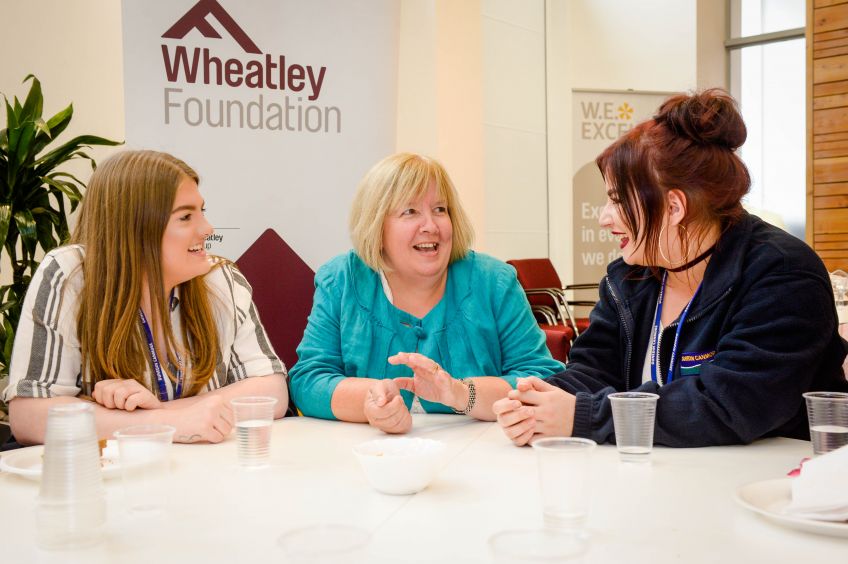It is time to close the ‘generation gap’
I was born at the start of the swinging sixties, just after Prime Minister Harold McMillan declared "most of our people have never had it so good", writes Mary Mulligan who sits on the board of Dunedin Canmore, part of Wheatley Group.

Sadly, I think our Prime Minister would struggle to make the same assertion to young people today.
Despite the wealth our country has, the so-called Millennial Generation is finding it increasingly difficult to get on in life.
Work is hard to find, often insecure and wages have stagnated; soaring house prices mean owning a home is almost impossible; and those who make it to university are graduating with thousands of pounds worth of debt.
People aged between 16 and 24 are now twice as likely to be out of work than any other age group. 40% of unemployed people are under the age of 24 – even though they make up just 17% of the population.
Tragically, it is the most vulnerable that are suffering the most. There are now around 220,000 people in Scotland under the age of 30 who are living in poverty. Half of homeless applicants here are under 30 years old.
Deprivation not only means people are struggling to eat, stay warm and put a roof over their own head, it also holds them back from achieving what they are capable of.
That is why Wheatley Group, Scotland’s largest housing, property and care organisation, which includes Cube, GHA and Dunedin Canmore, has established a charitable trust to break down some of the barriers that poverty puts in the way of young people’s aspirations.
The foundation, chaired by leading public health expert and former Chief Medical Officer, Sir Harry Burns, supports and funds a wide range of programmes which help people in some of the most disadvantaged communities in the UK lead better lives.
Imagine being a bright young person who has worked hard against the odds to gain a place at university – but then not to be able to afford the bus fare to get to lectures, or a laptop to study on, or even to be able to buy food.
Or desperately wanting to take your first steps on the career ladder, but finding every door closes in your face because you don’t have the contacts or the experience to get work experience or an internship.
Or simply not having someone else to support you achieve your dreams, or believing in what you can do.
This year, the Foundation will spend £3 million on a range of projects aimed at tackling poverty and social exclusion, education, employment, isolation and encouraging people to access sports, culture and arts.
They the Wheatley Pledge, a landmark scheme which encourages Wheatley Group’s contractors and suppliers to create job, apprenticeship and work experience opportunities for young people in the local community, by helping meet some of the costs.
It also includes an early intervention service, My Great Start, which helps people access bank accounts, register with health services and learn the skills they need to make a go of their tenancy.
Young people aren’t the only focus of the Foundation, but it has made a huge difference to hundreds of young people in Wheatley’s communities.
One of the programmes funded through the Wheatley Foundation is Wheatley Group’s award-winning Modern Apprenticeship scheme.
This year, with the support of the Wheatley Foundation, the group was able to double the number of apprentices it took on to 41.
I count myself very lucky to have spent some time with them in their first week.
They felt inspired and motivated – some for the very first time in their lives – but what really struck me was how much they wanted to help other people.
Most of them were from backgrounds we might call deprived – but rather than feeling sorry for themselves, they were hoping to use their opportunity to build better lives for people in their communities.
One of them, a young man of 19, had become homeless at the age of just 16. He told me of the help he had been given to turn his life around, and said he just wanted to help other people in the same way.
Another – a young mother - told me she simply wanted the chance to do what she could to help make people’s lives better.
It is these young people who give me real hope for the future, and I look forward to watching them develop and demonstrate how much they can achieve with the right support.
I know we can build a stronger and fairer economy through our young people, but we all need to work together to remove the obstacles and give them the opportunity to make a difference.
As a society, we all miss out if our young people are unable to flourish, and it is time we took the challenge seriously and responded.
Email:
Wednesday, November 23, 2016